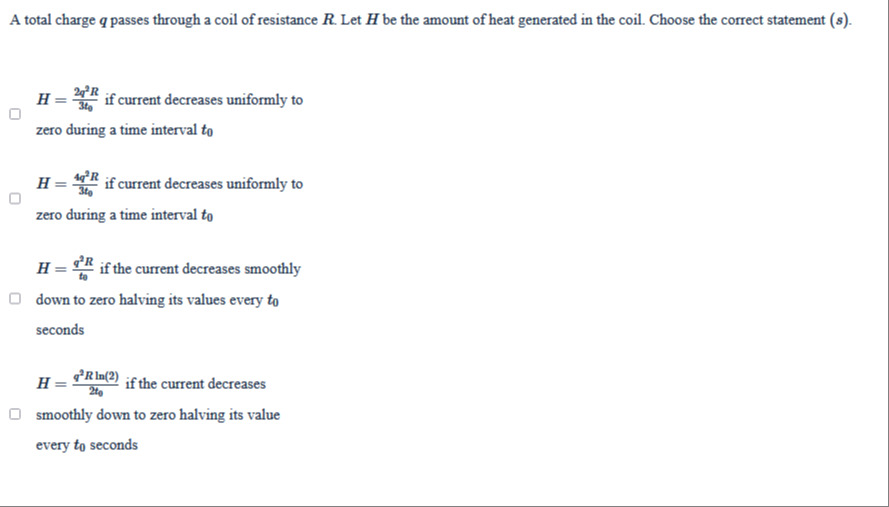Question
Question: A total charge q passes through a coil of resistance R. Let H be the amount of heat generated in the...
A total charge q passes through a coil of resistance R. Let H be the amount of heat generated in the coil. Choose the correct statement (s).

H=3t02q2R if current decreases uniformly to zero during a time interval t0
H=3t04q2R if current decreases uniformly to zero during a time interval t0
H=t0q2R if the current decreases smoothly down to zero halving its values every t0 seconds
H=2t0q2Rln(2) if the current decreases smoothly down to zero halving its value every t0 seconds
H = \frac{4q^2R}{3t_0} if current decreases uniformly to zero during a time interval t_0, H = \frac{q^2Rln(2)}{2t_0} if the current decreases smoothly down to zero halving its value every t_0 seconds
Solution
Let i(t) be the current flowing through the coil of resistance R at time t. The heat generated in the coil is given by H=∫Ri(t)2dt. The total charge that passes through the coil is given by q=∫i(t)dt.
Scenario 1: Current decreases uniformly to zero during a time interval t0.
Let the initial current at t=0 be i0. Since the current decreases uniformly to zero in time t0, the current as a function of time is given by a linear equation: i(t)=i0(1−t0t) for 0≤t≤t0.
The total charge q is the area under the i(t) vs t graph from t=0 to t=t0. This is a triangle with base t0 and height i0. q=21×t0×i0. Thus, the initial current is i0=t02q. Substituting this into the expression for i(t): i(t)=t02q(1−t0t). The heat generated is H=∫0t0Ri(t)2dt. H=∫0t0R[t02q(1−t0t)]2dt=Rt024q2∫0t0(1−t0t)2dt.
Let u=1−t0t, so du=−t01dt, which means dt=−t0du. When t=0, u=1. When t=t0, u=0. The integral becomes ∫10u2(−t0du)=−t0∫10u2du=t0∫01u2du. ∫01u2du=[3u3]01=31. So, ∫0t0(1−t0t)2dt=t0×31=3t0. H=Rt024q2×3t0=3t04q2R.
Scenario 2: Current decreases smoothly down to zero halving its value every t0 seconds.
This implies an exponential decay of the form i(t)=i0e−kt. The condition "halving its value every t0 seconds" means i(t+t0)=21i(t). i0e−k(t+t0)=21i0e−kt e−kte−kt0=21e−kt e−kt0=21 −kt0=ln(21)=−ln(2) k=t0ln(2). The current is i(t)=i0e−t0ln(2)t. The current approaches zero as t→∞. The total charge q is the integral of the current from t=0 to t=∞. q=∫0∞i0e−t0ln(2)tdt=i0∫0∞e−t0ln(2)tdt. Let α=t0ln(2). The integral is ∫0∞e−αtdt=[−α1e−αt]0∞=0−(−α1×1)=α1. q=i0×t0ln(2)1=i0ln(2)t0. So, the initial current is i0=t0qln(2). The current is i(t)=t0qln(2)e−t0ln(2)t. The heat generated is H=∫0∞Ri(t)2dt. H=∫0∞R[t0qln(2)e−t0ln(2)t]2dt=Rt02q2(ln(2))2∫0∞e−2t0ln(2)tdt. Let β=2t0ln(2). The integral is ∫0∞e−βtdt=β1. ∫0∞e−2t0ln(2)tdt=2t0ln(2)1=2ln(2)t0. H=Rt02q2(ln(2))2×2ln(2)t0=2t0q2(ln(2))R.
The correct statements are the ones corresponding to option 2 and option 4.
